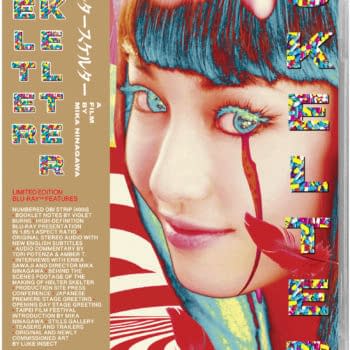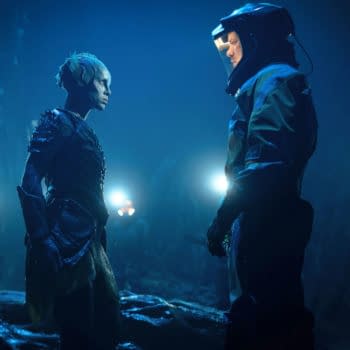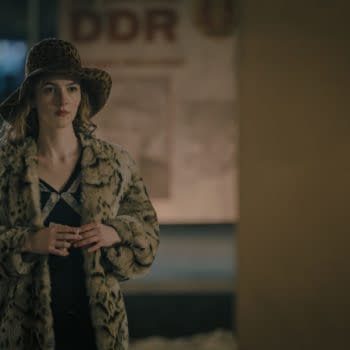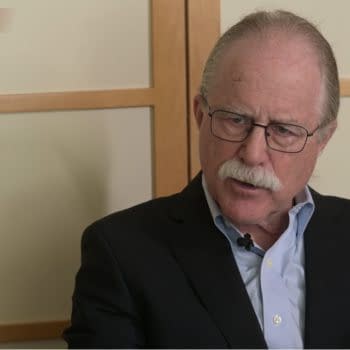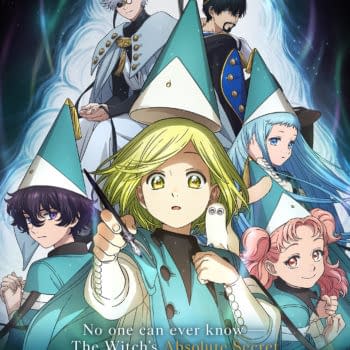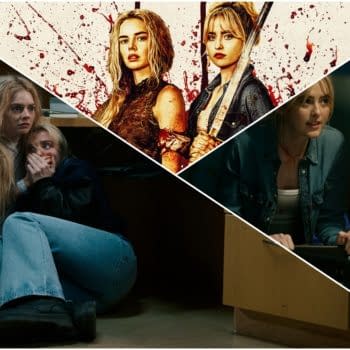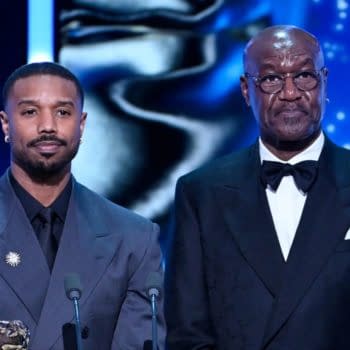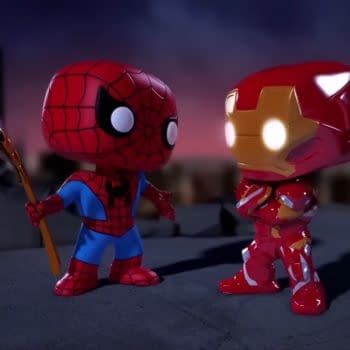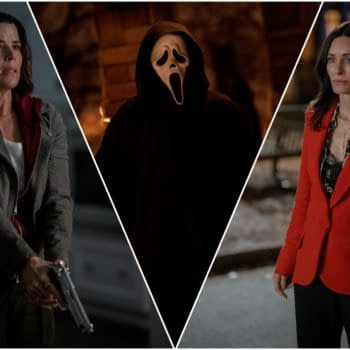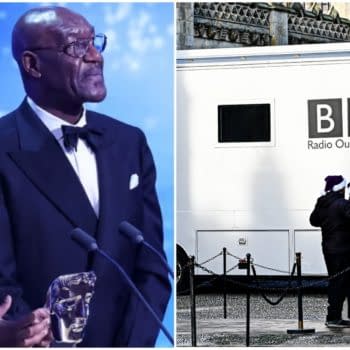Posted in: Interview, Movies | Tagged: asian-american movies, bee vang, comisery, indie movies, margin films, quentin lee, science fiction, streaming
Comisery Week – Interview with Bee Vang
Full disclosure: when I'm not working on screenplays and film work, I'm a correspondent for Bleeding Cool. In the week leading up to the premiere, the editors of Bleeding Cool have let me run a series of interviews with the cast and crew to talk about what it was like to make a movie during the lockdown, Comisery, shot on zoom, without leaving home. It's a new form of narrative filmmaking that the industry is still coming to terms with.
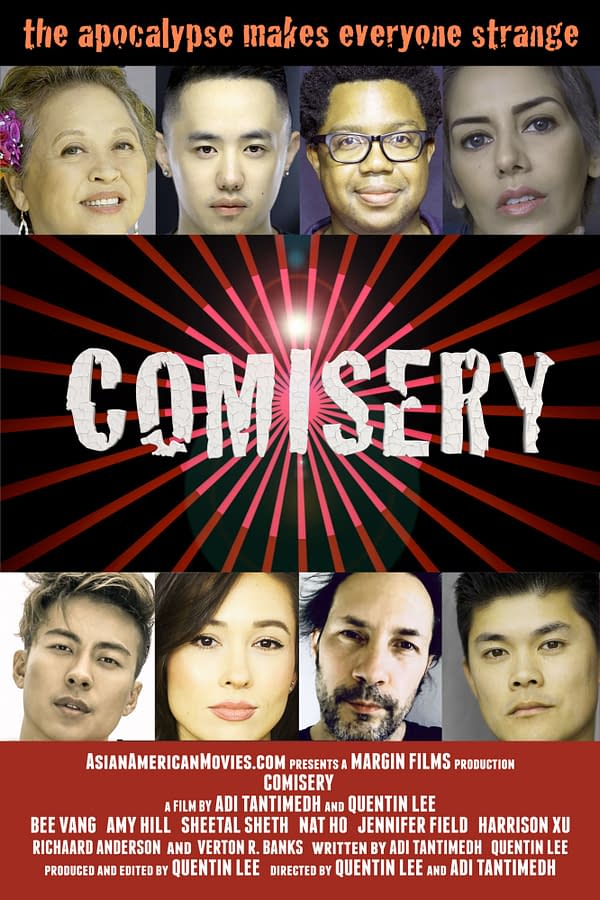
Comisery is an Asian-American Science Fiction Screwball Comedy that Quentin Lee and I created and made over eight weeks during the lockdown. It stars Bee Vang, Harrison Xu, Amy Hill, Jennifer Field, Nat Ho, Sheetal Sheth, Richard Anderson, and Verton Banks. It was a screwball comedy response to the pandemic and living under lockdown. It premieres on September 1st on Quentin's streaming service AsianAmericanMovies.com and on Amazon Video.
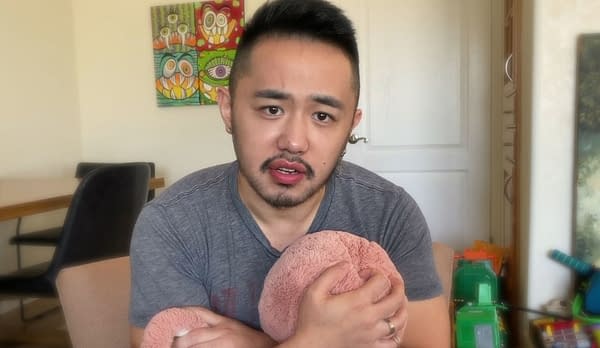
Today, we talk to Bee Vang, who plays Skylar Fang, around whom everything revolves in the story.
Bee Vang made his acting debut at the age of 15 in Clint Eastwood's 2008 movie Gran Turismo as Thau Vang Lor. He has appeared on Modern Family but concentrated on getting his degree and activism for social justice and on behalf of the Hmong community. He recently moved to Los Angeles to resume his acting career, and Comisery is his first new major role in a movie. He plays Skylar Fang, the character around whom everyone revolves. Skylar is a gender nonbinary person mourning the death of their boyfriend Danny (Verton R. Banks) when things in lockdown get even crazier.
Beginnings
It has been a long time since Gran Torino. What have you been doing in the meantime?
BV: Yeah, it has been 12 years! It was in the summer of 2008 when we shot Gran Torino. And I was 15 at the time and a rising junior in high school. Before Gran Torino, I thought I was gonna go to Med School or Law School. And for sure, Gran Torino didn't change things for me too much; I continued my studies and eventually applied to university. I got into Brown University, my first choice. I matriculated. And once I got there, my interests shifted. I pursued my intellectual and research interests and got into economic theory and geopolitics. I was still acting during this time at Brown, including performing in two-stage performances. And I also studied Chinese opera and Japanese theater overseas. (I definitely did not let my creative side diminish too much.) The liberal arts training I received made me consider becoming a professor. I wanted to research, write, teach, and lecture. Then things changed again. I wanted to write, maybe go into journalism. But I found myself coming full circle, wanting to devote my life to doing artistic and creative things.
On LGBTQ Representation
How did Quentin approach you about playing Skylar Fang in Comisery? What did he say about the role to you?
BV: Quentin and I first met each other circa 2009. We had overlapping interests and met each other because of the Asian American political and advocacy circles we were in. At that time, we talked about some film projects, but we never worked together creatively, and so when he first approached me, I was excited at the prospect of collaborating. He actually called me and told me a bit about the premise of Comisery and the character, Skylar Fang, a Hmong American character who was nonbinary and living in the midst of a pandemic and grieving over the death of their lover. Quentin also said that it would be an Asian American-centered story that would speak to this moment of COVID-enabled anti-Asian racism and xenophobia. This was important to me because, as an artist, I don't believe in making work that doesn't speak to the moment it's in. So, Quentin's pitch was quite compelling.
I originally wrote the role – before I met you – as lighter and more comedic, but once I saw that you were a serious emotional actor who could deliver the intensity and the authenticity, I began to write specifically to your strengths. Quentin and I wanted your character Skylar to ground the story in reality or at least emotional truth. Can you tell me your thoughts about the character?
BV: I have no background or any training whatsoever in comedy, so I was definitely intimidated by this role and project. Drama is my go-to. But this role made me realize the importance of emotional versatility as an actor. It's no secret that I was watching Golden Girls and taking inspiration from the sarcasm and wit of Bea Arthur and the rest of the cast. The amount of prep time notwithstanding, Skylar remained a challenge. I was dealing with my own mental health issues, and so for Skylar, I had to strike that balance of being able to channel my own emotions and feelings, while also living the truth of Skylar's grief in addition to their interests in non-normative sexual practices and being nonbinary. This made performing Skylar complicated. These bits of Skylar's background added layers to their characterization that I wanted to draw out. And I wanted to be able to do it respectfully. There were times I wished Skylar could have also been more hyperbolic and odd and less grounded in emotional realism. But I think that realism was Skylar's purpose in the narrative and storytelling.
Quentin and I wanted a proper LGBTQ character in the story, and as I wrote it, Skylar was the character who was the most normal out of the cast. Everyone else is sort of odd and nuts in one way or another even before the alien invasion. Skylar was the one who expresses the audience's point of view and bewilderment most. How did you approach each installment as events unfolded before Skylar?
BV: This year has been the epitome of outlandish and wild things. It's very much like Comisery. And my approach to Skylar was to react and to take it all in as we all have been during this pandemic. One way I did this was to imagine myself in a Lewis Carrollian world, where "everything would be nonsense. Nothing would be what it is, because everything would be what it isn't. And contrariwise, what is, it wouldn't be. And what it wouldn't be, it would." My preparation would then consist of having the emotional range and capacity to shift gears as I worked opposite and in response to my castmates.
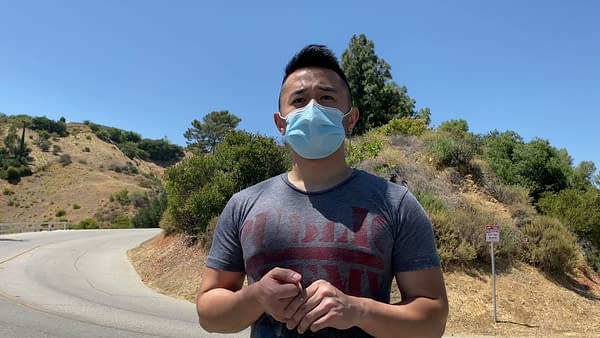
On Acting on Zoom
How did it feel to perform on zoom with a cast of six vastly different performers with their own styles and energy? Did we sort of plunge you in the deep end?
BV: It was definitely weird, albeit interesting, to work on the Zoom platform. Rehearsing was a necessity. It often makes me think about how, if we start to think and do from a place of exuberance and excess, rather than from a place of scarcity, we can imagine more and do more. What could we possibly achieve, right? Opportunity emerges from crises, as the saying goes. Getting to work with a predominantly Asian American cast was one such opportunity. The creative synergy between us–Amy Hill, Jennifer Field, Harrison Xu, Sheetal Sheth, Nat Ho, Verton Banks, and Richard Anderson–was another because everyone was just so talented and able to make the platform work for us. It was wonderful and a great learning experience working with everyone, even if we actually never met in person. Comisery was experimental and fun, and it showed what it took to be able to come together to shoot something in the midst of a pandemic.
You can play light and funny when called for, but my favourite parts of your performance were your ability to switch from light to serious to light again in the blink of an eye, as well as the well of grief that the character is carrying. You grounded the story so much that when you smiled, there was a sense that things might be okay. Did your character and the story go where you thought it would?
BV: Dealing with loss and grief is never easy. Grief is a terrible thing. When I was preparing for the character, I read a lot of medical literature on disorders and other conditions. I pored over essays and articles on grieving, depression, survivor's guilt, and more. I even found myself reading Søren Kierkegaard's The Sickness unto Death. It wasn't entirely a happy character research period! But I think it was all this, the heavy pall I created for myself from my research, that forced me to want to make Skylar happy and light-hearted.
What do you make of the whole experience at the end?
I wanted Skylar to overcome their grief and not be defined by it. And I think the development of the story allowed that growth to happen. This is why I believe Comisery, in many ways, was a kind of bildungsroman, a coming-of-age story. This is also why Skylar says, borrowing from Kierkargaard: "Life can only be understood backward, but it must be lived forwards." The ending of Comisery made me realize that Skylar, as Asian American, nonbinary, queer, was always humanized. Skylar got the closure they deserved.
Would you be interested in a sequel if one were to happen?
Part of what made Comisery great was to use the pandemic as a kind of backdrop, a metaphor for what the characters went through. Comisery reminds us that everything is ephemeral, including the most intense of our feelings, no matter how strongly we may feel them at any moment. And for sure, a sequel would be fun! I am always for Asian American content.
Comisery is available AsianAmericanMovies.com and on Amazon Video.



